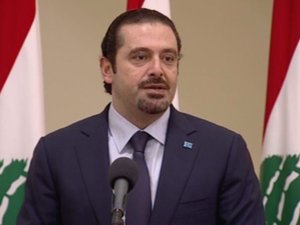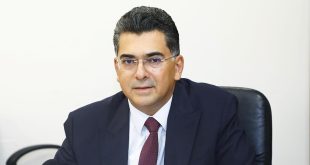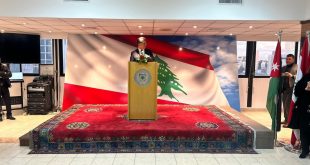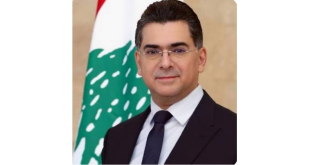Prime Minister Saad Hariri announced Monday that Lebanon would have a new vote law by Wednesday despite remaining obstacles that could unravel the agreement reached by the country’s top leaders to avert a parliamentary vacuum and clear the way for holding the first elections since 2009.
He also said that neither he nor the Future Movement would run the elections under the disputed 1960 majoritarian law used in the last parliamentary elections.
Hariri spoke before an important meeting of political rivals was held at his Downtown Beirut residence Monday night in a last-ditch attempt to agree on a final version of the vote law agreement reached by President Michel Aoun, Speaker Nabih Berri and the premier at Baabda Palace on June 1. The agreement would divide Lebanon into 15 electoral districts, each of which would elect representatives on a proportional basis.
The meeting brought together Finance Minister Ali Hasan Khalil, a top political aide to Berri, Foreign Minister Gebran Bassil, Lebanese Forces’ deputy chief MP George Adwan, and Nader Hariri, Hariri’s chief of staff. As The Daily Star went to press shortly after midnight, no details of the meeting emerged.
“The month of Ramadan has witnessed a lot of challenges, particularly those related to an electoral law. Everybody wonders whether there will be an electoral law or not. I have said from the beginning that we would have an electoral law,” Hariri said in a speech during an iftar he hosted for cultural bodies, scouts associations and sports clubs at the Grand Serail Monday night attended by a number of ministers and dignitaries. “All political parties have no choice but to have a new electoral law.”
Referring to the sticking points in the vote law, such as the preferential vote and the vote tallying procedures, Hariri said: “We will finish all these matters between today [Monday] and tomorrow [Tuesday] God willing. We will have a [new] electoral law by Wednesday. With the will of God, things are moving in this direction and I don’t think there is any problem in this respect. I don’t think that anyone wants to obstruct this path.”
The premier staunchly rejected accusations that he was working to reinstate the 1960 law. “The issue of the 1960 law, as far I am concerned, is a page that has been turned … If someone thought that I wanted to adopt the 1960 law, I tell him: I, Saad Hariri, will not run for the elections under the 1960 law and not even the Future Movement. This is my stance I have said it in the past to all the parties. Today, I say it for the first time in public.”Hariri has scheduled a Cabinet session for Wednesday billed “crucial” that would endorse the new vote law if the remaining wrinkles were ironed out. The electoral law is the first topic on the 47-item agenda of the Cabinet session to be chaired by Aoun at Baabda Palace.
The fact that the session is to be held at Baabda Palace raised hopes of the Cabinet’s endorsement of the vote law before referring it to Parliament for a final ratification by lawmakers at a legislative session set for Friday, four days before the expiry of the legislature’s term.
The endorsement of the executive and legislative branches of the vote law is deemed essential to replace the 1960 system and set the stage for holding parliamentary elections once preparations are completed.
Earlier in the day, an official source told The Daily Star that an important meeting would be held behind-the-scenes after the iftar Monday night to resolve some sticking points that are holding up a final deal on the vote law.
Despite confirmation by almost all parties on the need to have a new vote law endorsed by the Cabinet and Parliament before June 20, the source said there are still three hitches that could delay the implementation of the deal.
“Contentious issues remain over the national threshold [the percentage each candidate needs to win an electoral seat in any district], the representation of Lebanese diaspora, and whether the preferential vote should be based on the qada [district] or muhafaza [governorate],” the source said.
Wednesday is the “beginning of a solution, rather than the beginning of a crisis,” said Adwan, who has been key in narrowing differences over the vote law. “The chance to endorse the electoral law exists if intentions were good and the law was kept away from other battles,” he told Al-Jadeed TV.
In addition to the above-mentioned three sticking points, Adwan said the vote tallying procedure has not been solved.
Bassil, head of the Free Patriotic Movement, reiterated the FPM’s demand for “constraints” in the proportional vote system that call for maintaining parity between Muslims and Christians and the creation of a senate as stipulated by the 1989 Taif Accord. Bassil wants the parity to be confirmed in a constitutional text. “The completion of the [vote] agreement requires constraints and specific reforms that must be consecrated in the new electoral law,” he said.
The duration of a technical extension of Parliament’s term is still a contentious issue that has not been solved as Interior Minister Nouhad Machnouk has suggested a seven to eight month delay of the elections to train judges, and heads of polling stations on the proportional vote system used for the first time in Lebanon.
MP Mohammad Raad, head of Hezbollah’s bloc in Parliament, called for wrapping up the debate over the vote law. “We must finalize the vote law within the next few days so that elections can be held under the new vote law,” he said. “Time is not in anyone’s favor.”
 Lebanese Ministry of Information
Lebanese Ministry of Information



